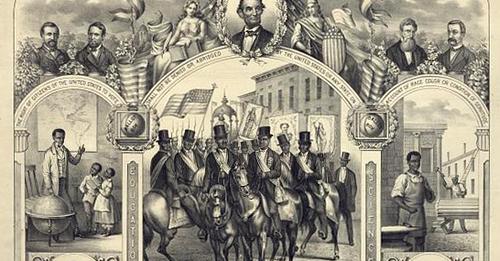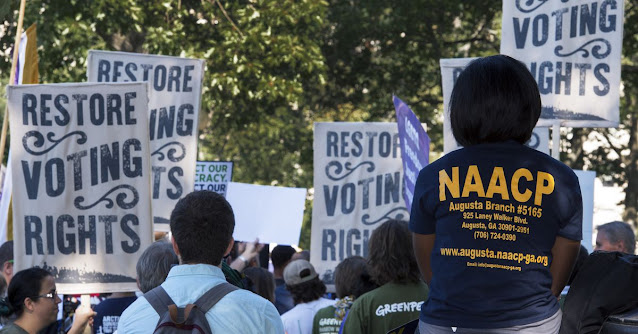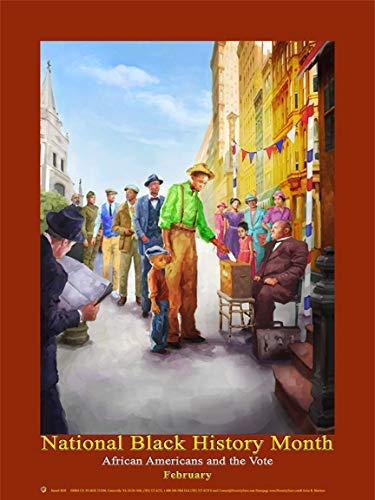African Americans cast their first votes during Reconstruction in 1867, In 1870 the 15th Amendment was meant to specifically protect that right.
Anniversaries
of two amendments to the U.S. Constitution which protected
and extended voting rights for African Americans and the poor
were recently marked. The 15th Amendment
ratified on February 3, 1870 prohibited the Federal government
and each state from denying or abridging a citizen’s right
to vote “on account of race, color, or previous condition of servitude.” The 24th Amendment was ratified
on January 23, 1964. Yet today voting
rights are under sweeping attack not only in the states of the old Confederacy
but everywhere Republicans control state legislatures and/or governorships.
The
15th Amendment was the last of three and perhaps the least known of three
dealing with slavery and the rights of the formerly enslaved. The
13th adopted as the Civil War was drawing to a close in 1865
finally abolished slavery in all states including those which remained loyal
to the Union. It was followed
by the 14th in 1868 which guaranteed citizenship to former slaves
as well as providing due process and equal protection under the law. It is the basis for most modern civil
rights laws and has been interpreted to cover other minorities and
women as well as Blacks.
It is the most litigated of all Constitutional amendments and
the center of intense struggle by liberals and conservatives on
the Supreme Court. The current
court has a right wing majority thanks to appointments by the former
Resident of the United States and has demonstrated a willingness,
even eagerness, to roll back long-established rights.
Under
post-Civil War Reconstruction freed slaves had citizenship and voting
rights under the protection of occupying Federal Troops in the former
Confederacy. Blacks and their Republican
allies who were smeared as carpetbaggers by former Rebels were
able to elect local officials, majorities in state
legislatures, judges, governors, and members of the U.S.
House of Representatives and Senate.
Blacks thrived with new rights to own property, establish
businesses, enter trades and professions, and be educated.
But
even the most ardent supporters of Reconstruction recognized that
it could not continue indefinitely.
Former Confederates who swore loyalty to the Union had their franchise
restored as a condition of Southern states ratifying the 14th
Amendment. New generations of whites
became eligible voters when they reached maturity meaning
that whites—mostly Democrats—would inevitably return to power. The 15th Amendment was meant to ensure
that states and local governments would continue to respect the voting
rights of Blacks.
It
was a good and necessary idea as night riding and terrorism
by groups like the Ku Klux Klan were already attacking and intimidating
Black leaders and voters and even challenging Federal troops. They were seen as armed extensions of un-reconstructed
Democrats.
The
15th Amendment was simple and clear. It read:
Section 1.
The right of citizens of the United States to vote shall not be denied or
abridged by the United States or by any State on account of race, color, or
previous condition of servitude.
Section 2.
The Congress shall have power to enforce this article by appropriate
legislation.
It
might have been effective if Reconstruction was allowed to continue for
a longer period. Unfortunately,
in 1876 the Presidential election between Republican Rutherford B.
Hayes and Democrat Samuel Tilden was thrown into the House of
Representatives despite Tilden’s narrow popular vote majority.
After round upon round of fruitless votes in the House where each
state delegation cast one vote, a deal was struck electing
Hayes in exchange for withdrawing troops from the South
effectively ending Reconstruction in 1877.
Without
troops to enforce the Constitution Blacks were quickly subjugated by
force and intimidation. Before 1890 virtually
all Black office holders were gone. Black
voters were purged from the rolls and state courts refused
to recognize their rights. Poll taxes
and impossible literacy tests were just two of the “legal”
means used to strip them of their voting rights. The Jim Crow Era ushered in waves of
new segregation laws and many blacks were plunged back into a condition
barely above official chattel slavery.
Without
Federal enforcement the 15th Amendment was a virtual dead letter.
The
first poll tax became effective Georgia as early as 1871. It was allowed under Reconstruction because
the poll tax impacted poor whites as well as Blacks. The idea slowly spread and really took off
after Federal troops were evacuated. By
1905 all former Confederate states had adopted a poll tax in one form or
another. Several states required that
all cumulative taxes be paid to vote meaning a would-be registrant of
middle age could be held liable for all taxes since he—only males were
then voting—turned 21.
By
the 1930s some states had abandoned the taxes, but six states retained them until
1966—Virginia, Alabama, Mississippi, Arkansas, and Texas.
The states in light blue and red retained their poll taxes until the passage of the 24th Amendment, Those in gray had not formally abandon them but kept them on the books despite being unenforced.
Despite
rollbacks in some states the poll tax survived a legal challenge
in the 1937 Supreme Court case Breedlove v. Suttles, which unanimously
ruled that:
[The] privilege of voting
is not derived from the United States, but is conferred by the state and, save
as restrained by the Fifteenth and Nineteenth Amendments and other provisions
of the Federal Constitution, the state may condition suffrage as it deems
appropriate.
Note
that the Court characterized voting as a privilege instead of a right.
Campaigns
against poll taxes began in earnest after World War II causing some
states to rescind their act. In 1948 Harry Truman considered a recommendation
of his President’s Committee on Civil Rights to legislatively
act against the taxes but in the face of united opposition from Southern
Democrats in Congress concluded that only a Constitutional Amendment would be
effective. During the post-war Red
Scare and McCarthy Era, the movement to kill the tax in Congress and
in the states ground almost to a halt as supporters were labeled Communists
because the movement had been led by avowed Marxists such as Alabama antiracist,
civil rights activist, labor organizer Joseph Gelders, New
York Congressman Vito Marcantonio, and W.E.B. Du Bois.
Later
in the 1950’s as the Civil Rights Movement in the South ramped up,
so did political pressure to end the poll tax. President John F. Kennedy administration
urged Congress to adopt and send such an amendment to the states for
ratification. He considered the Constitutional amendment the best way to
avoid a filibuster, as the claim that federal abolition of the
poll tax was unconstitutional would be moot. Some liberals
opposed Kennedy’s action, feeling that an amendment would be too slow
compared to legislation. Florida
Senator Spessard Holland, a conservative Democrat introduced the amendment
in the 87th Congress. Holland had opposed most civil rights legislation
during his career, and his support helped splinter the monolithic Southern
opposition to the amendment.
Ratification
of the amendment by state legislatures across the country was relatively quick,
taking slightly more than a year from August 1962 to January 1964. South Dakota became the 38th and deciding
state to put it over the top.
Only two former Confederate states, Florida and Kentucky,
and three Southern leaning Boarder states, Maryland, Tennessee,
and Missouri were among the supporters. Mississippi outright rejected
the amendment almost as soon as it cleared the U.S. Congress. Surprisingly,
Georgia where the poll tax originated, passed the amendment unanimously in
the Senate but did not pass the House before South Dakota secured adoption. The issue was dropped there and never
subsequently acted upon.
Long
after the amendment went into effect four additional Southern states finally ratified—Virginia
in 1977, North Carolina in 1989, Alabama in 2002, and Texas
in 2009. It is safe to say
if a vote was taken today it would not pass in the last two states which have become
radically more right wing and lead the country in voter suppression
schemes. Seven states still have not
ratified and show no inclination to do so—Arizona, Arkansas,
Georgia, Louisiana, Oklahoma, South Carolina, and my old
home state of Wyoming the “Equality State.”
Even
the passage of the amendment did not immediately end poll taxes. Recalcitrant states maintained the
onerous levies only applied to Federal elections for President, the House of
Representatives, and the Senate and continued to require payment to participate
in local and state elections. Arkansas
suspended its poll tax by referendum in the November 1964 General Election
several months after the amendment was ratified and did not repeal all mention
of the tax in the state constitution until 2008 but still refuses to ratify the
Federal amendment. Federal District Courts
in Alabama and Texas struck down their poll taxes in late 1965. The Supreme Court finally ruled in the
case of Harper v. Virginia State Board of Elections that poll
taxes were unconstitutional even for state elections.
It
was the formal death knoll of the taxes, although attempts were made in
some states to revive fees in some guise or another. Voter
registration struggles intensified across the South with the Freedom Summer campaign
spearheaded by the Student Non-Violent Coordinating Committee (SNCC)
in 1964 and the Selma campaign culminating with the March to
Montgomery in1965. Both efforts were
met with violent police suppression, mass arrests, and several murders
by the Ku Klux Klan.
Norman Rockwell's stark and dramatic painting of the murder of voting rights activists James Chaney, Andrew Goodman, and Michael Schwerner helped rally support for the passage of the Civil Rights Act of 1965 which finally put teeth in enforcement of the 15th and 24th amendments.
Public
horror at the murders of Freedom Summer activists James Chaney,
Andrew Goodman, and Michael Schwerner and the deaths of Jimmy
Johnson, Unitarian Universalist minister James Reeb, and U.U. laywoman
Viola Liuzzo during the Selma campaign led directly to the passage of the landmark
Civil Rights Act of 1965. The act enforced
voting rights guaranteed by the Constitution for racial minorities throughout
the country, especially in the South. As
vigorously enforced by According to the Department of Justice, the was the most
effective piece of Federal civil rights legislation ever enacted and one
of the most far-reaching in history.
Under
the provisions of the Act states with histories of racially motivated interference
and some counties with similar histories in other states were put
under court review to any changes to their election laws. That prevented repeated efforts to find new
ways to suppress voting and led to the widespread election of Black officials
at every level in the South. It was the
most effective tool for guaranteeing access to the ballot
for decades.
But
that critical tool was crippled by the Supreme Court in the case of Shelby
County v. Holder when it ruled that a section of the Act which outlined
a formula for judicial review of state laws violates the Constitutional principles
of “equal sovereignty of the states” and federalism because its disparate
treatment of the states is “based on 40 year-old facts having no
logical relationship to the present day.” While the Court did not
completely repeal judicial review, it so gutted it as to make practically moot. Subsequent rulings have further narrowed
applicability. More recently the Court
struck down court review of most district Gerrymandering arguing how
states draw lines if their business so long as districts are fairly
equal in population.
In
response Red State legislatures have stampeded with all sorts of
laws aimed at restricting voter participation among minorities and other
populations suspected of being sympathetic to Democrats or liberals. Unlike original Jim Crow laws these actions
are not meant to completely block minority voting but to make it as difficult
and burdensome as possible to shave just enough of the vote away
to guarantee the continued domination of white conservatives.
These
outrages have helped spark a revived Civil Rights Movement
to combat the new voter repression with the John Lewis Voting Rights
Advancement Act and the Freedom to Vote Act, finally passed after
being blocked in the Senate while conservative Democrats Joe Manchin of West
Virginia and Kyrsten Sinema of Arizona voted along with Republicans
to oppose a filibuster rule change that would allow election
legislation to pass with a simple majority. After the election of President Joe Biden
a deal was finally struck with Manchin causing a tie in the Senate that Vice
President Kamala Harris was able to break.
Meanwhile
angry voting rights activists took the fight back to the states where they are
met with creative new ways to suppress access to the ballot
The
old pattern of rolling back Black and minority rights is repeating itself. But it will be met with massive resistance.























